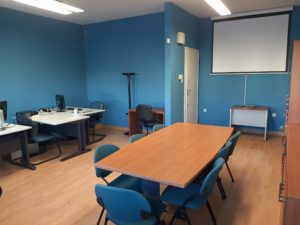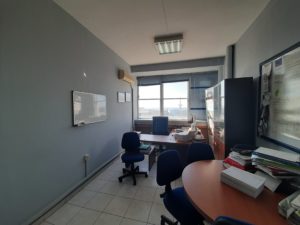The Laboratory
The Laboratory of Planning and Project Management is one of the oldest labs in the Faculty of Engineering of the Aristotle University of Thessaloniki. It was founded by the Decree No 3422 as Chair of Construction Equipment in the academic year 1955 – 1956. In 1990, the Presidential Decree No 317/13-09-1990 (Greek Government Gazette 130Α/27-9-1990) established the Laboratory of Construction Equipment and Planning, in order to cover the educational and research needs in the field of construction equipment and the planning of construction projects. Recently, in 2017, the lab was renamed to “Laboratory of Planning and Project Management (LPPM)” and the Rules of Procedure were determined. The laboratory today belongs to the Division of Transport and Project Management of the School of Civil Engineering of the Aristotle University. The modules of the lab include the engineering project management and the planning of processes, methods, and resources for the correct application of project management in engineering companies.

Research Topics

Digital twins and information systems management
- Building Information Modeling
- Virtual / Augmented Reality
- Machine learning – Big data

Lean construction
Process-based and technological restructuring of the construction procedure to minimize the usual failures of production.

Logistics
Small or big scale logistics for construction sites of public and private infrastructures and projects

Infrastructure systems management
- Functionality and reliability control of infrastructure
- Increase of infrastructure resilience
- Integration of smart systems in existing infrastructures

Infrastructure’s economic evaluation
- Probabilistic life-cycle cost analysis of infrastructures, e.g., tunnels, bridges etc
- Integrated system of cost-benefit analysis of infrastructure projects

- Dynamic predictive system for bridges’ life-cycle “service value”
- System for fast, early estimation of road work quantities, duration and cost

Operation analysis, construction equipment management & economics
- Dynamic Planning of Construction Sites for Linear Projects
- Machine learning applications for construction equipment productivity optimization
- Application of Multi-criteria Decision Analysis (MCDA) methods for hierarchizing the construction equipment’s procurement criteria
- Application of Multi-criteria Decision Analysis (MCDA) methods for hierarchizing the construction equipment operator’s performance factors for optimizing the equipment’s productivity
- Construction equipment economic life optimization by tracking their operating and maintenance time-patterns (history)
- Machine learning applications for predicting construction equipment economic indicators (eg. residual value)
- Conceptual model development for applying a comprehensive prescriptive maintenance model, as an evolution of the predictive maintenance model, which is currently applied



Facilities
The facilities of the Laboratory of Planning and Project Management are located at the third floor of Building A in the Faculty of Engineering. The facilities include the offices of the permanent staff members of the lab’s human resource, as well as workplaces for the PhD candidates. Additionally, the laboratory’s facilities feature one multi-purpose room that accommodates meetings and presentations for a limited number of participants.
Infrastructure
The laboratory has technical infrastructure and digital tools, which encompass software packages and programs for the execution of complex analyses. In particular, the project management analyses are executed by the program Microsoft Project, while the digitization of construction is processed by the educational versions of Autodesk Revit and Trimble Tekla. For decision making and risk analyses the laboratory employs PALISADE DecisionTools, a software package which includes the tools @Risk, PrecisionTree, TopRank, BigPicture, StatTools, NeuralTools, Evolver and RISKOptimizer. For complex statistical analyses, IBM SPSS is utilized.
-

- Line of marching ants with 7 different ant images
-

- Line of marching ants with 7 different ant images
-

- Line of marching ants with 7 different ant images










